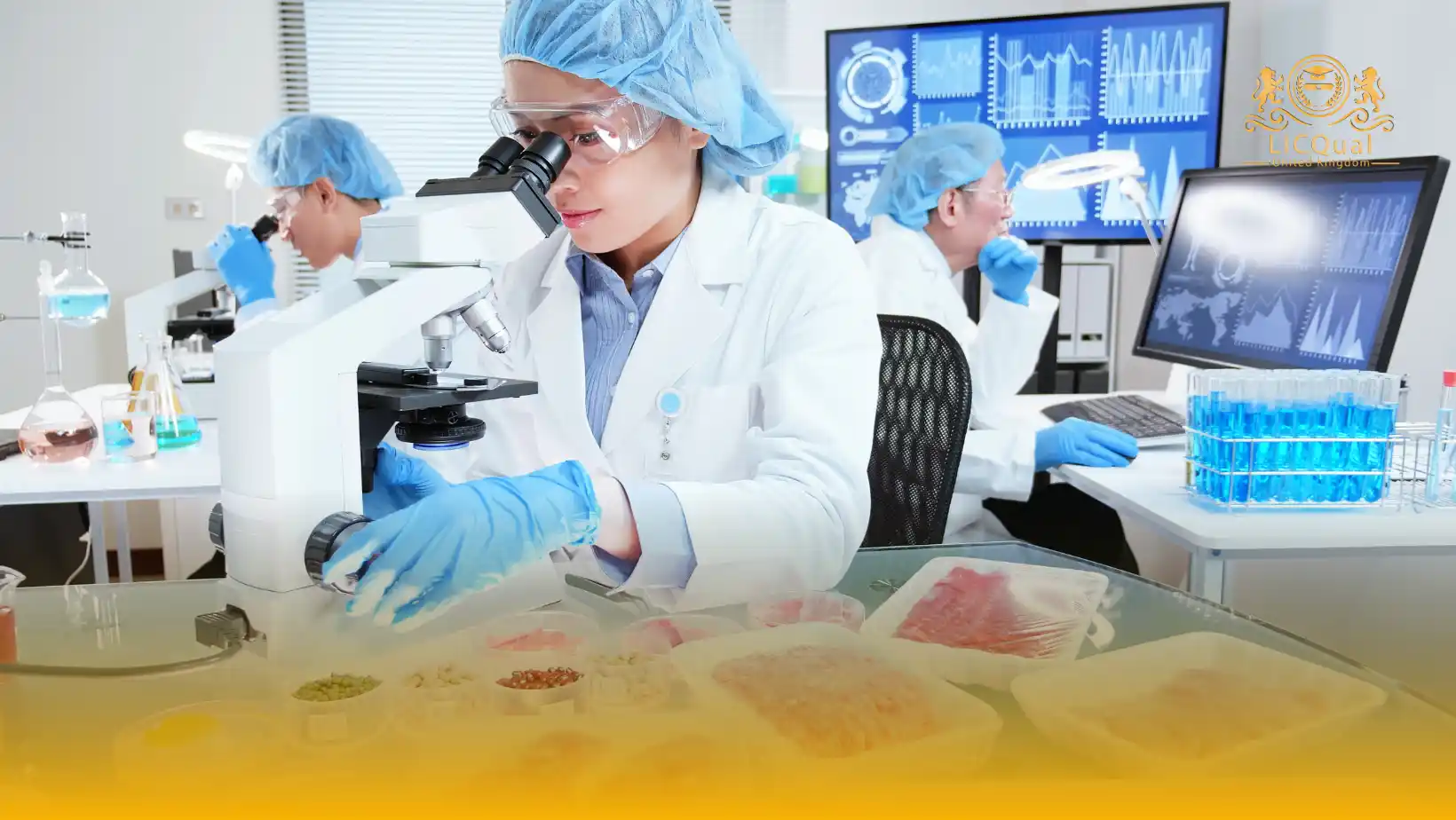The LICQual Level 3 Certificate in Food Safety and Nutrition (Cert Food Safety) is a comprehensive qualification designed to equip learners with essential knowledge and practical skills in food safety management and nutritional principles. This course provides a strong foundation in understanding how safe food handling, preparation, and storage practices directly contribute to public health, while also highlighting the critical role of nutrition in maintaining wellbeing.
Learners will explore the scientific basis of food safety, common foodborne hazards, hygiene standards, and the legislative frameworks that govern food safety practices. In addition, the qualification covers nutritional guidelines and the importance of promoting healthy eating in both professional and community settings. This unique blend of food safety and nutrition knowledge prepares learners to apply best practices across a variety of sectors, including hospitality, healthcare, food production, and public health initiatives.
This qualification is particularly suited to professionals aiming to enhance their career opportunities, expand their expertise, and strengthen their Continuing Professional Development (CPD). It provides the tools and confidence needed to support safe food systems and improve nutritional health in diverse environments.
Centres delivering this qualification must ensure that training is delivered by competent and qualified staff with expertise in food safety and nutrition. Centres are also required to provide learners with access to high-quality learning resources, facilities, and support services, ensuring an effective training experience and successful learner outcomes.
The LICQual Level 3 Certificate in Food Safety and Nutrition is not only a valuable step towards professional growth but also a vital qualification for those committed to promoting safe, nutritious, and healthy food practices.
Course Overview
Qualification Title
LICQual Level 3 Certificate in Food Safety and Nutrition (Cert Food Safety)
Total Units
6
Total Credits
24
GLH
120
Qualification #
LICQ2201026
Qualification Specification
To enroll in the LICQual Level 3 Certificate in Food Safety and Nutrition (Cert Food Safety), applicants must meet the following criteria:
|
Qualification# |
Unit Title |
Credits |
GLH |
|---|---|---|---|
|
LICQ2201026-1 |
Principles of Food Safety and Hygiene |
4 |
20 |
|
LICQ2201026-2 |
Food Contamination and Prevention |
4 |
20 |
|
LICQ2201026-3 |
Food Safety Management Systems |
4 |
20 |
|
LICQ2201026-4 |
Fundamentals of Human Nutrition |
4 |
20 |
|
LICQ2201026-5 |
Nutrition and Health Promotion |
4 |
20 |
|
LICQ2201026-6 |
Professional Practice in Food Safety and Nutrition |
4 |
20 |
By the end of this course, learners will be able to:
Unit 1: Principles of Food Safety and Hygiene
By the end of this unit, the learner will be able to:
- Explain the importance of food safety and hygiene in protecting public health
- Identify key legislation and regulations governing food safety practices
- Describe safe food handling, storage, and preparation methods
- Assess the consequences of poor food safety and hygiene practices
Unit 2: Food Contamination and Prevention
By the end of this unit, the learner will be able to:
- Identify biological, chemical, and physical contaminants that affect food safety
- Explain the sources and risks associated with different types of contamination
- Apply methods to reduce the risk of foodborne illnesses
- Evaluate the effectiveness of contamination control measures in various settings
Unit 3: Food Safety Management Systems
By the end of this unit, the learner will be able to:
- Explain the principles and benefits of HACCP (Hazard Analysis and Critical Control Points)
- Describe the role of monitoring, verification, and documentation in food safety systems
- Apply food safety management practices in line with regulatory requirements
- Evaluate the effectiveness of a food safety management system in maintaining standards
Unit 4: Fundamentals of Human Nutrition
By the end of this unit, the learner will be able to:
- Explain the functions of macronutrients and micronutrients in human health
- Describe the processes of digestion, absorption, and metabolism of nutrients
- Assess the impact of poor nutrition on health and wellbeing
- Apply dietary guidelines to support balanced and healthy eating
Unit 5: Nutrition and Health Promotion
By the end of this unit, the learner will be able to:
- Explain the relationship between nutrition and the prevention of diet-related diseases
- Identify strategies for promoting healthier food choices in individuals and communities
- Apply behaviour change models to support positive nutritional habits
- Evaluate the role of nutrition in maintaining long-term health and wellbeing
Unit 6: Professional Practice in Food Safety and Nutrition
By the end of this unit, the learner will be able to:
- Demonstrate professional and ethical standards in food safety and nutrition practice
- Communicate effectively with individuals and groups on food safety and nutrition issues
- Reflect on personal and professional development in food safety and nutrition
- Develop an action plan to apply knowledge and skills within workplace or community contexts
The LICQual Level 3 Certificate in Food Safety and Nutrition (Cert Food Safety) is designed for anyone looking to enhance their knowledge of food safety, hygiene, and nutrition. This course is ideal for professionals in the hospitality, catering, healthcare, or food production sectors, as well as individuals passionate about maintaining safe and healthy food practices. It provides practical skills that can be applied in professional or personal settings.
1. Aspiring Food Safety Professionals
- Gain foundational knowledge in food hygiene and safety practices
- Understand the principles of safe food handling
- Learn how to prevent foodborne illnesses
- Develop skills for compliance with health regulations
- Prepare for advanced certifications in food safety
- Build credibility in the food and hospitality sector
2. Catering and Hospitality Staff
- Learn proper kitchen hygiene and sanitation techniques
- Apply safe food storage and preparation methods
- Implement HACCP principles effectively
- Support healthy meal planning and nutrition practices
- Ensure compliance with food safety regulations
- Enhance professional skills and career opportunities
3. Healthcare and Support Staff
- Improve knowledge of safe food practices for patients
- Understand nutrition principles for health promotion
- Learn to manage dietary requirements safely
- Reduce risk of foodborne illnesses in healthcare settings
- Support wellness initiatives and patient care
- Gain a recognized Level 3 certificate for career growth
4. Food Production and Manufacturing Workers
- Apply food safety principles in industrial environments
- Monitor hygiene standards throughout production processes
- Implement quality control and safe handling procedures
- Understand regulatory compliance requirements
- Enhance workplace safety and nutrition awareness
- Develop professional credibility in food production
5. Students and Career Changers
- Explore opportunities in food safety, nutrition, and wellness careers
- Gain an accredited Level 3 certification for your CV
- Learn practical, transferable skills for professional growth
- Prepare for advanced courses or diplomas in nutrition or food safety
- Develop a strong foundation in evidence-based practices
- Access flexible online learning for busy schedules
6. Community and Public Health Workers
- Promote safe food handling in communities
- Educate groups on nutrition and healthy eating
- Design and implement local health programs
- Support long-term community health improvements
- Apply practical food safety knowledge in outreach programs
- Build confidence in public health initiatives
7. Individuals Seeking Personal Knowledge
- Learn how to safely prepare and store food at home
- Understand the link between nutrition and health
- Gain skills to plan healthy meals
- Prevent foodborne illnesses in daily life
- Build confidence in managing household food safety
- Improve overall wellbeing through nutritional knowledge
Centres delivering the LICQual Level 3 Certificate in Food Safety and Nutrition (Cert Food Safety) must meet the following requirements to ensure high-quality training and learner success:
- Qualified and Competent Staff – Trainers, assessors, and internal quality assurers must hold relevant qualifications and experience in food safety, nutrition, and vocational education.
- Adequate Learning Resources – Centres must provide up-to-date learning materials, textbooks, digital resources, and access to reliable reference materials.
- Practical Facilities – Suitable facilities should be available for practical learning and assessments, including environments that simulate real workplace conditions in food safety and nutrition.
- Assessment and Quality Assurance – Centres must have robust systems in place for conducting fair, valid, and reliable assessments, supported by regular internal quality assurance processes.
- Learner Support – Centres should provide guidance, academic support, and access to resources that enable learners to achieve their qualification successfully.
- Policies and Procedures – Clear policies on equality, diversity, health and safety, and safeguarding must be implemented to ensure compliance with regulatory standards.
- Technology Access – Centres should ensure learners have access to digital tools, e-learning platforms, and resources to support flexible and interactive learning.
- Commitment to CPD – Staff must actively engage in Continuing Professional Development (CPD) to maintain current knowledge in food safety, nutrition, and education best practice.
Assessment and Verification
All units within this qualification are subject to internal assessment by the approved centre and external verification by LICQual. The qualification follows a criterion-referenced assessment approach, ensuring that learners meet all specified learning outcomes.
To achieve a ‘Pass’ in any unit, learners must provide valid, sufficient, and authentic evidence demonstrating their attainment of all learning outcomes and compliance with the prescribed assessment criteria. The Assessor is responsible for evaluating the evidence and determining whether the learner has successfully met the required standards.
Assessors must maintain a clear and comprehensive audit trail, documenting the basis for their assessment decisions to ensure transparency, consistency, and compliance with quality assurance requirements.







